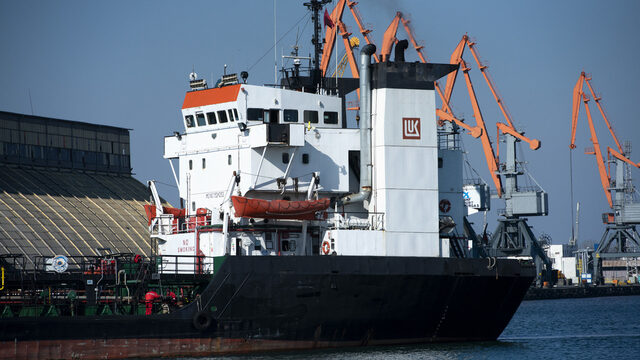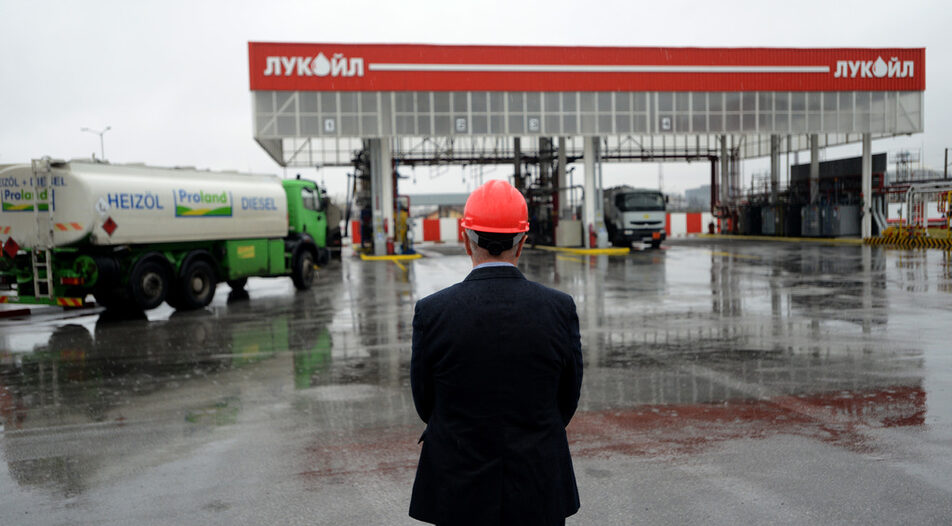- Since the beginning of the war in Ukraine, Bulgaria has switched to using even more Russian oil
- Imports of alternatives to Russian oil and products are forbiddingly expensive
- The sector faces difficult questions about its supplies, processing, transport and liquidity
We want a two-year deferment on the EU-wide ban on imports of Russian oil - this is the official position of Bulgaria. The country is amongst the four most dependent on Russian imports of crude oil in the EU, together with Hungary, Slovakia and the Czech Republic. For this group everything else would mean a huge spike in fuel prices, with a heavy toll on the economy.
Instead of diversifying supplies, since the beginning of the war in Ukraine Bulgaria has switched to consuming more Russian oil. The international sanctions against Russia have led to some market distortions, with the price of Russia's Urals crude oil coming at a significant discount compared to other blends. Additionally, Bulgaria's main refinery - Lukoil Neftochim Burgas, is technologically tuned to use Russian crude, and Lukoil Bulgaria is a strong player in the wholesale fuel market. The combination makes imports of refined oil products rather difficult, dooming importers to losses. Venturing to import non-Russian oil or fuels derived from non-Russian crude is now described as "a suicide" by the sector.
Lukoil's stranglehold
In the field of production, the largest refinery of Russia's Lukoil in Europe is located in Bulgaria, and at the moment it operates with 100% Russian oil. The trend of diversification is practically non-existent - things are going in the completely opposite direction.
The good news is that reconfiguring the plant and working with larger quantities of non-Russian raw material is possible. But it would take time and effort. And it depends on the desire of the participants.
At the same time, there are some changes within the Russian company. Less than a month ago, its founder Vagit Alekperov resigned from the board of directors. While the explanation given to the public claimed that the goal was to avoid sanctions against the company, the resignation led to speculation about the company's future in the new political environment. The market changes are also challenging for the Lukoil trader - Litasco, which now simultaneously faces good profit opportunities and uncertain future.
This opens several key questions for the Bulgarian oil sector. Where will the raw material come from? How is the production going to adapt? Is it possible for imports of refined products to compete with the refinery's output?
100% Russian
"Currently, 100% of the processed oil is Russian. The supply of alternative oil to our market is very limited. This is due to increased demand for alternative crude oil, pushed up by the possibility of an embargo on Russian oil," Lukoil Neftochim Burgas commented for Capital Weekly. And instead of diversifying Russian oil supplies, the trend is exactly the opposite.
The impossible import is also confirmed by fuel traders, who have been signaling for some time that the Bulgarian fuel market has become more and more Russian, and there are almost no opportunities for counteraction. The reason is that the prices at which Lukoil Bulgaria sells on the domestic market are among the lowest in the EU.
"You can't sell it at a profit, you can't sell it at a minimum loss. The only way to sell it is at a huge loss of 100 dollars per ton," traders say. For a small cargo of 6000 tons, this means a loss of 600 thousand dollars - the difference between the domestic price of Lukoil Bulgaria and prices on the commodity market.
The shrinking of the non-Russian market is due to the fact that there are fewer and fewer buyers of Russian oil globally and its price has dropped sharply. This has led to prices of Russian Urals crude of 75-80 dollars per barrel, compared to 108-112 dollars for Brent, or 30-35% higher price.
How the refinery will work?
Diversification at the refinery in Burgas is possible however. Until now, the plant has usually used a mix of different types of crude oil, as the lighter ones are suitable for production of petrol and kerosene, while the heavier ones are used for production of medium and heavy distillates such as diesel and gas oil.
The refinery explains that for the first quarter of 2022, 63% of the processed oil was of Russian origin. This share has now reached 100% because of the prices. The refinery has tried to raise the share of non-Russian oil in previous years by more than 50% and has experience in processing oil from the Middle East and North Africa.

Russian Urals has a Sulphur content that is lower than that of most Middle Eastern blends, but higher than Brent's. This means a problem for desulphurization at some point in the distillation process, equipment wear and possibly lower capacity operation. The refinery commented that with some types of oil, such as Brent, there is a possibility to shrink the Russian oil to a small percentage, but with the Middle East type the minimum possible is 50%.
The refinery had also invested in a hydrocracking plant for the heaviest oil fractions and has increased its efficiency. The production of light fuels and changes in the raw materials would probably mean deviation from the indicators.
Sources from the industry claim this does not mean it is impossible to set up the refinery to work without Russian oil. Yet the motivation for that is not high. The other problem lies in the uncertain future and prices.
"No one can say what complex changes in the design of the refinery will have to be made, because no one can say what types of oil will be available. At the moment there are no alternatives, because there is no supply of other types of oil to our market. This shortage of alternatives is becoming global due to unchanged supply levels and higher demand caused by the widespread ban on Russian oil," Lukoil Neftochim Burgas said.
Is it possible without Russia?
So far, it is not clear what the intended EU ban on Russian oil imports will look like in terms of parameters and deadlines, and what will happen to Lukoil's liquidity.
According to industry sources, better sources of crude oil for Bulgaria, based on the specifics of the raw material, are Saudi Arabia, Iran, Algeria, Egypt, the United Arab Emirates. There are also possibilities of oil arriving through the Caspian Pipeline Consortium pipeline, which supplies Romania's Rompetrol, owned by Kazakhstan's KazMunayGas. An important detail, however, is that the pipeline ends at the Russian Black Sea port of Novorossiysk so there is also a crossing point with Russia.
The refinery in Burgas is practically an exporter of products and especially diesel. Without production, the country will have to rely on imports of refined products. Possible sources for them are Greece and Turkey, for example, and Bulgaria will compete with Ukraine for these fuels, market participants say.
Another issue is the import corridor. The port for large tankers is Rosenets, near Burgas, operated by Lukoil. According to industry sources, the port of Burgas is appropriate for smaller ships of up to 6,000 tons, which is more unprofitable compared to the import of 30,000-ton tankers. Varna Base Oil Terminal is another option, but it will need some improvements. Without a port for large tankers, imports can be made by rail and truck - in smaller quantities and less profitable.
The important question remains who will be the person with the money to import, as the import by a 25,000-ton tanker requires roughly $30 million. On the Bulgarian market, the major international oil companies are mainly focused on retail. Apart from the Russian leader, smaller local traders such as Saksa, Bulmarket and Insa Oil are engaged in imports, (the last one imports diesel and gas oil according to unofficial information from the market, as it has credit limits and contracts, but the fuel is still of Russian origin). The market will face the issues of financing, securing letters of credit, liquidity, stability and the desire of players.
Switzerland in the picture
Since the beginning of the war in Ukraine, large oil companies have boasted significant profit growth. The huge price differences also allow large margins for the Lukoil's trading company in Switzerland - Litasco, which buys the raw material from Russia, probably at prices quoted on the local market (much lower than those on world markets) plus taxes. Unofficially, market sources say the margin is several hundred dollars per ton.In December 2020, Lukoil Neftochim Burgas became a subsidiary of Geneva-based Litasco S.A - Lukoil's exclusive sales representative for the supply of oil and refined products outside Russia. Since the beginning of 2021, the refinery in Burgas has been operating under the "processing" scheme for Dutch-registered Lukoil Benelux, part of the Lukoil group owned by Litasco, receiving revenue for the processing service.
In brief, Litasco owns the crude oil, which is processed at the Lukoil Neftochim Burgas refinery, buying and exporting fuel from Novorossiysk to Burgas. All oil products that come out of the refinery are still owned by Litasco - through its Lukoil Benelux company. The company sells the products of Lukoil Bulgaria, also owned by Litasco.
The main objectives of this highly complicated transfer pricing can be two - it is either tax or competitive advantages in pricing.
If Lukoil or Russian oil fall under sanctions against Litasco, it would become extremely difficult to buy oil from the free market, market sources explain. And now the company is having a hard time finding trade financing, they say. This means inability to obtain letters of credit from commercial banks, difficulties with hedging, inability to defer payment and need to work only with prepayment, which requires free liquidity.
A month after the start of the war, Reuters reported that Litasco had reduced operations to guarantee a substantial amount of margin calls following Western sanctions. Reuters quoted a Litasco's spokesman as saying that there has been a "natural temporary reduction in our corporate activity in order to make sure we can operate within our sufficient liquidity pool."
Reuters sources also say that Litasco has stopped hedging to preserve cash and that the company is focusing on supplying its four refineries in Europe and selling refined products.
- Since the beginning of the war in Ukraine, Bulgaria has switched to using even more Russian oil
- Imports of alternatives to Russian oil and products are forbiddingly expensive
- The sector faces difficult questions about its supplies, processing, transport and liquidity
Read More












